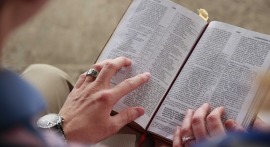The number of Americans who do not ascribe to a religious group is growing, which may be the result of social shifts and generational change, according to a survey by Pew Research.
According to nationwide surveys conducted in the 1970s and 80s, Pew reports that less than 10 percent of U.S. adults reported to not identify with any religion. However, that number has increased to 23 percent who report identifying themselves as atheists, agnostics, or "nothing in particular."
While it may seem that the U.S. is becoming less religious, a Pew survey suggests that religious "nones' are more likely than in the past to identify themselves as such.
The survey also cites generational change as one of the factors contributing to the growing number of Americans with low levels of religious commitment.
According to Pew's 2014 Religious Landscape Study, young people who are not religious appear to be more comfortable than their older counterparts who are equally not religious to identify as "nones."
Millennials with a low level of religious commitment (79 percent) identify themselves as atheist, agnostic, or "nothing in particular" in greater numbers than do the "silent or older" generation who was born before 1946 (54 percent). According to the study, 45 percent of those from the "silent or older" generation who claim to have a low level of religious commitment claim a religion.
The same contrast was seen between highly religious Millennials and the highly religious group of older generations, in that highly religious Millennials (8 percent) were more likely to identify as religiously unaffiliated than their older counterparts from the Silent generation (1 percent).
The survey also points to generational replacement as a factor, as Millennials are less religious than their older counterparts and constitute a growing sector of the population as they replace older Americans.

















